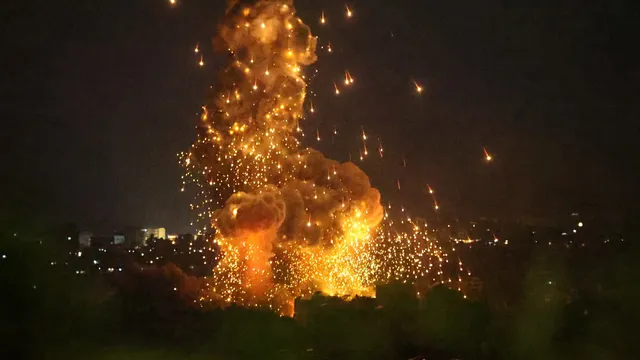
Hezbollah Rockets Strike Haifa, Wounding 10 Amid Beirut Blasts
2024-10-07 14:58- An Israeli airstrike in southern Lebanon has killed at least 10 firefighters.
- Hezbollah's rocket attacks on Haifa have resulted in injuries and prompted Israeli military responses.
- The ongoing conflict has escalated significantly, raising concerns about civilian safety and humanitarian conditions.
Express your sentiment!
Insights
In Lebanon, an Israeli airstrike has reportedly killed at least 10 firefighters in the southern region, escalating tensions in the ongoing conflict. This incident follows a series of rocket attacks by Hezbollah on the Israeli city of Haifa, marking the first direct assault on the city since the conflict intensified. The Israeli military responded with airstrikes targeting Hezbollah positions in Beirut, indicating a significant escalation in hostilities. The situation remains volatile as both sides continue to exchange fire, with civilian casualties mounting in both Lebanon and Israel. The conflict has been exacerbated by the anniversary of the October 7 attacks, which has heightened emotions and military responses from both parties. As the violence continues, international observers are concerned about the humanitarian impact on civilians caught in the crossfire, with calls for restraint and dialogue growing louder.
Contexts
The Israel-Lebanon conflict has a long and tumultuous history, deeply impacting civilians on both sides. Since October 8, 2023, Hezbollah has engaged in a series of attacks across the southern Lebanese border, retaliating against Israel's military actions in Gaza, which have resulted in the deaths of over 41,500 people. The ongoing violence has led to significant casualties, with at least 566 people killed in Lebanon, including 133 civilians, and 97,000 displaced from their homes. The situation remains dire as both sides continue to exchange fire, with Israel targeting Hezbollah positions in response to the group's aggressive tactics. Hezbollah's rise to power began in 1985, when it successfully forced the Israeli army to withdraw to the Litani River, establishing a so-called 'security zone' along the Lebanese-Israeli border. This zone was policed by the South Lebanon Army, an Israeli proxy force, until Israel's withdrawal in 2000. The political landscape shifted in 1992 when Hezbollah entered parliamentary politics, gradually increasing its influence and seats in the Lebanese assembly. However, the group has remained committed to armed resistance against Israeli occupation, leading to a cycle of violence that has persisted for decades. The conflict has seen numerous military operations, including Operation Accountability in 1993 and Operation Grapes of Wrath in 1996, both of which resulted in significant civilian casualties and displacement. The 2006 Lebanon War further escalated tensions, with Hezbollah's actions provoking a massive Israeli military response that devastated Lebanese infrastructure and led to thousands of civilian deaths. As the conflict continues into 2023, the humanitarian crisis deepens, with civilians bearing the brunt of the violence. The international community watches closely, hoping for a resolution that can bring lasting peace to a region long plagued by conflict.